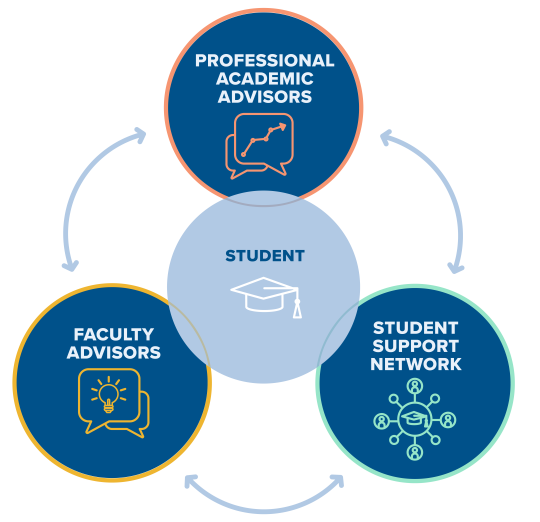About
University Advising is a springboard for student success and a campuswide resource for all things academic advising. No matter where you ultimately receive your academic advising, we are here to help you get connected so you can make the most of your college experience.
University Advising Center
Select one of the following options to expand:
Our team is dedicated to empowering undergraduate students to achieve their academic goals. We encourage self-discovery, informed decision-making, and are committed to supporting students in understanding degree requirements, navigating university policies, overcoming barriers to academic success, and fostering a sense of belonging. We provide general advising that is holistic, proactive, inclusive, and meaningful.
Our team is comprised of six Professional Academic Advisors. We provide general advising from orientation through graduation to approximately half of all current students. Our scope of support includes general-population undergraduates declared in 49 majors (out of 56), including:
- American Multicultural Studies (BA)
- Anthropology (BA)
- Applied Statistics (BA)
- Art History (BA)
- Art Studio (BA)
- Art Studio (BFA)
- Bi-Disciplinary Mathematics (BA)
- Biochemistry (BS)
- Biology (BA)
- Biology (BS)
- Chemistry (BA)
- Chemistry (BS)
- Chicano & Latino Studies (BA)
- Cinematic Arts & Technology (BA)
- Communication Studies (BA)
- Computer Science (BS)
- Criminology & Criminal Justice Studies (BA)
- Dance (BA)
- Earth & Environmental Science (BA)
- Electrical Engineering (BS)
- English (BA)
- Environmental Science, Geography & Management (BS)
- Environmental Studies, Geography, & Planning (BA)
- Environmental Studies (BS)1
- French (BA)1
- Geography & Environment (BA)1
- Geology (BS)
- Global Studies (BA)
- History (BA)
- Human Development (BA)
- Kinesiology (BS)
- Mathematics (BA)
- Mathematics (BS)
- Music (BA)
- Music (BM)
- Nursing, Pre-Licensure (BS)2
- Philosophy (BA)
- Physical Science (BA)
- Physics (BA)
- Physics (BS)
- Political Science (BA)
- Pre-Nursing2
- Psychology (BA)3
- Sociology (BA)
- Spanish (BA)
- Statistics (BS)
- Theatre Arts (BA)
- Undeclared
- Women’s & Gender Studies (BA)
1 Programs have been discontinued and are being taught-out
2 Includes all special-population students as well
3 Freshman class-standing only (0-29 units completed)
Additionally, we provide eligibility advising to all current Student-Athletes participating in our NCAA Division II Intercollegiate Athletics program, regardless of major.
* Note: If you are affiliated with a designated special-population and/or if you are a general-population undergraduate declared in one of the 7 majors not listed here (i.e., you are in an academic program with an assigned Program Coordinator and/or college-based Professional Academic Advisor), you will receive tailored support from your specific program. For more information, please check out Find Your Advisor.
Campuswide
Select one of the following options to expand:
Sonoma State University recognizes effective and meaningful academic advising as an ongoing, multifaceted, developmental process which is integrally related to the rest of the educational experience. Academic advising is designed to provide the necessary tools, information, and support to enable students to take responsibility for: developing educational plans compatible with their personal, academic, and professional goals; meeting institutional and degree requirements; and preparing for a life of change, challenge, individual fulfillment, active citizenship, and public service.
Sonoma State University takes a shared, collaborative, and student-centered approach to academic advising. Through a complementary partnership between Faculty Advisors and Professional Academic Advisors, with holistic support from our Student Support Network, our campus entities work together to promote students’ academic excellence, personal achievement, and persistence toward on-time graduation.

Students are expected to accept ultimate responsibility for their decisions, academic performance, course selection, educational pathway, and graduation timeline. This includes, but is not limited to: taking ownership of exploring and clarifying their values, skills, and abilities, as well as their personal, academic, and professional goals. Students should seek opportunities to get involved, enrich their educational experience, and build connections within our campus community.
Additional examples of taking ownership:
- Engage early and often with Professional Academic Advisors, Faculty Advisors, and the Student Support Network
- Come prepared to advising sessions with questions and updates on progress
- Be open about how you are doing and what you need to be successful
- Complete any action items or recommendations you've been assigned in a timely manner
- Become familiar with academic requirements, regulations, and deadlines for your degree and/or program
- Understand and adhere to university policies
- Utilize available services and campus resources as needed
- Regularly review your Academic Requirements Report (ARR)
Professional Academic Advisors predominantly support students with general advising. This includes, but is not limited to: empowering decision-making, goal-setting, and self-authorship; course registration; academic advising tools and resources; graduation requirements within General Education; academic standing and academic probation; and university policies, processes, and related forms.
Additional examples of general advising:
- Holds and to-do list items
- Transitional support, holistic needs, and overcoming barriers to academic success
- Fostering belonging and connectedness
- Major and minor exploration for both open and selective programs
- Major and minor declaration for open programs
- Transfer and test credit
- Academic related interventions (alerts, referrals, and progress reports)
- Referrals, wayfinding, student support triage, and where to seek advising
Academic advising is part of the additional professional responsibilities of faculty. Faculty Advisors predominantly support students with academic advising for majors/minors, as well as credentials and certificates. This includes, but is not limited to: overall graduation requirements; internships, research, and field experience; relevant co-curricular opportunities; and career and graduate school mentorship.
Additional examples of major/minor advising:
- Course substitutions within the major/minor
- Major/minor declaration for selective programs
- Course content
By participating in New Student Advising & Registration during NOMA Nation Orientation...
- Students will become familiar with vocabulary terms and elements related to degree requirements and course registration (e.g., FLC, GE, GWAR, electives, lower-division vs. upper-division, etc.)
- Students will be introduced to tools and resources related to degree requirements and course registration (e.g., MySSU, LoboConnect, General Catalog, Academic Requirements Report, Transfer Credit Report, Seawolf Scheduler, etc.)
- With support from Faculty and/or Professional Advisors, students will register for a full-time course load that supports student success, degree progress, goal attainment, and on-time graduation.
By engaging early and often with your Professional Academic Advisor...
- Seeking Advising Early & Often: Students will know why, where, and how to seek advising.
- Developing Self-Authorship: Students will actively participate in advising and understand their role in developing their educational pathway.
- Navigating Course Registration: Students will know how to register for courses and utilize supporting tools/resources.
- Identifying Degree Requirements: Students will be able to find and utilize their Academic Requirements Report (ARR) to identify the degree requirements that are completed, in-progress, and outstanding.
- Locating Policies, Processes, & Forms: Students will know where to find enrollment policies, processes, and related forms.
- Maintain Good Academic Standing: Students will understand Good Academic Standing, Satisfactory Academic Progress (SAP), Academic Probation, and Disqualification.
- Leveraging Agency & Meaning: Students will be able to find and utilize the Program Roadmap for their major and General Education (GE) requirements, identify where they have agency in the curriculum, and curate a meaningful educational pathway.
- Owning Your Graduation Timeline: Students will understand how their educational pathway impacts their graduation timeline.
- Integrating Enrichment & Support: Students will understand how campus resources, services, and co-curricular opportunities enrich and support their educational pathway.
- Connecting the Dots: Students will understand how their educational pathway connects their values, skills, and abilities to their personal, academic, and professional goals.
By engaging early and often with your Faculty Advisor...
- Students will learn which major courses and necessary prerequisites are required for graduation.
- Students will understand how to sequence their courses to persist toward on-time graduation.
- Students will have access to the wealth of academic and industry experience and expertise.
- Students will be supported in the work they do in their chosen program of study.
- Students will be able to discuss graduate school options, internships, and career mentoring.
- Students will learn ways to become involved in undergraduate research and relevant co-curricular opportunities.
- Students will be connected with other faculty that share their educational or career interests.


